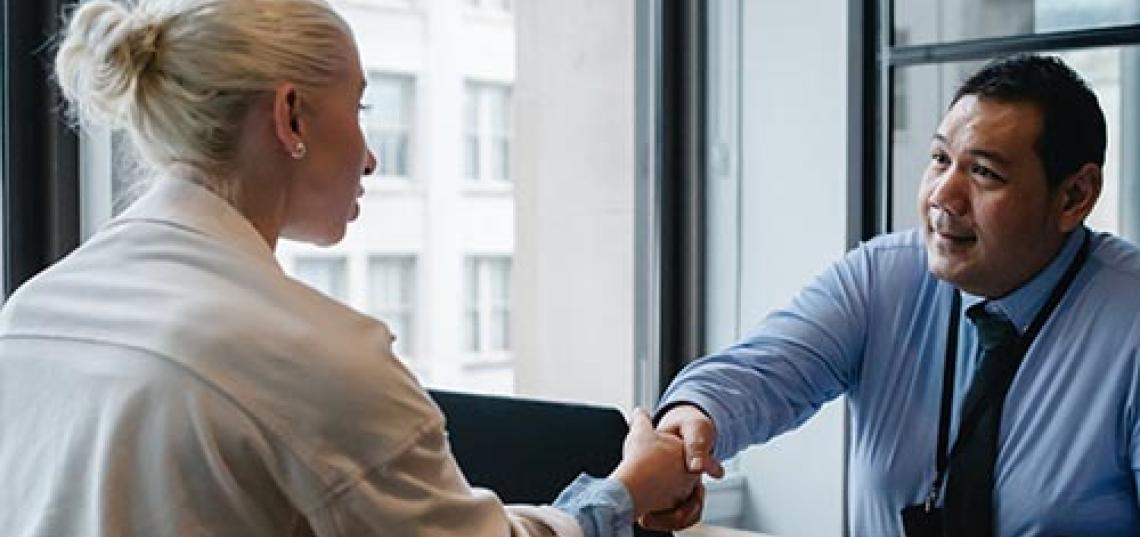
By Charles Wasilewski
Three SC&I graduates came back to campus – virtually – to give insights to students about job searches and the workplace, in an online panel discussion conducted by the MCM/MHCI Graduate Student Association (GSA).
GSA, a student-led organization open to students and graduates of the Master of Communication and Media (MCM) and Master of Health Communication and Information (MHCI) programs, gives students with opportunity to network, learn from peers and make friends.
GSA vice president Margaret Curran MHCI ‘23, a Johnson & Johnson Fellow in Corporate Social Responsibility, who moderated the panel, explained that the panel gave alums “the chance to share their stories and what they’ve been through since graduating with their Masters.”
Touching base with students were:
- Frankie Pignataro (MCM ‘22), marketing coordinator at Universal Tennis
- Ryan Stolz (MCM ‘22), senior account executive at FleishmanHillard
- Cassidy Duhigg (MCM ‘22 dual degree), global employee communication specialist at Kenvue
Participants included the leaders of the GSA: Susan Carolonza Chanin MCM '22, events program director; Margaret Curran MHCI ’23, vice president; Katelyn Reardon MCM ’23, communications director; and Stephanie Olaso MHCI ’23, president.
Imposter Syndrome
A big challenge in transitioning to a career, alumni acknowledged, is imposter syndrome. Noted Pignataro: “If you either haven’t had your first full-time job yet, or you only had internship experience, you may not think that you’re actually ready for that specific role -- when in reality you are.”
“Knowing that you have the education that has backed you and supported you and prepared you for your future careers” is vital to getting over imposter syndrome, she added, as is “putting yourself in better situations to practice having more confidence.”
Multitasking
Multitasking took on new meaning on the job for Stolz. Working for a public relations firm was “a world of difference” from an internship. “I have different bosses on different accounts -- a lot different than when I was” an intern, where “I had one boss to answer to, one mission, one client.”
Networking
Duhigg faced the challenge of not knowing “what I wanted to do with my life.” Her remedy: take “any opportunity that present[ed] itself.” That meant exploring the unfamiliar, but “I figured that would lead me to my next chapter. So, I took a bunch of different opportunities that may not have looked perfect when they were in front of me, but they all ended up working out to leading me to where I am now … how to manage is just take chances.”
Discussing how he networked for jobs, Stolz focused on “building relationships, building connections, finding commonalities, and seeing how you can be a resource for them and [how] they can be a resource for you. I’ve found in the long run that’s paid off more in terms of building a lasting relationship -- and they’re more likely to help you.”
Interviews
Duhigg noted: “Once you land an interview, you’re so close to landing a job.” So, preparing for that interview is “super important. I would research companies and people on LinkedIn to get a feel for what they do and who they know.” She used that info to shape talking points for interviews. She sought “a really good understanding” of the company including recent news. “I would try to bring that up in interviews” to show “that [I] went the extra step and [am] really invested in the company.”
Stolz advised learning about the person you’ll be interviewing with. “You’d be surprised how many people are Rutgers grads or interned at the same place previously or there’s some kind of connection that you can naturally bring up in the interview.” That helps bond with the interviewer, giving them a reason to remember your interview as opposed to someone else’s.”
Pignataro advised interviewees looking for a creative role to “come into that interview with a few ideas that you would implement in that company,” and coming “prepared as if you’re ready to walk into their office and start working.”
Workplace Skills
Discussing the skills they’ve found to be most important in the workforce, the alumni noted that client management, working with influencers, communications and working in group settings are highly important in public relations.
“If you’re dealing with a difficult person, how can you get what you need to get done effectively and appropriately so it’s done in the correct manner?” pointed out Duhigg. Working well with people is vital. “In my role it’s always teams working on a project. It’s never usually just one person working on something. Working in those group projects in the MCM program have really helped develop those skills.” She added the predominance of virtual work redoubles the need to be able to communicate effectively.
Learn more about the Master of Communication and Media and Master of Health Communication and Information Programs on the Rutgers School of Communication and Information website.
Charles Wasilewski, BA, MBA, is a student in the Master of Communication and Media program at Rutgers School of Communication & Information.
Image source: Pexels
